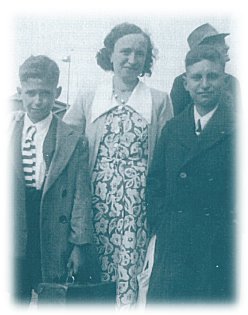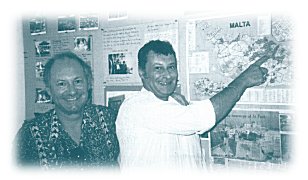



| March 1999 | Volume 2, Issue 1 |
Table Of Contents
|
Malta Bound - A Journey of Remembrance A Personal Story From One of the Old Boys Almost a third of the more than 1100 youngsters sent out to institutions run by the Christian Brothers in W.A. came from Malta. This is an account of the experiences of one of the Maltese child migrants - John ("Johnie") Grima. (Johnie is pleased that something of his life story will be the first account of a Maltese experience to be published in our Newsletter). Johnie Grima has a recollection from early childhood of Malta at War, pounded by German bombs. He tells of his father wrapping him in a blanket and carrying him down to a candle-lit air-raid shelter "filled with old ladies praying" -- and for good reason! In Search of a Better Life Times where very hard in Malta in the years immediately after the War. Hearing from afar of Australia's prosperity, Johnie's parents resolved to emigrate with their seven children. The two oldest, Johnie and his older brother Carmelo ("Charlie") were sent to W.A. in advance of the rest of the family in the hopes that they might get the groundings of a good education. In 1952 Johnie, aged 9 years, arrived with Charlie, aged 11 years, on the Asturias. A Rude Awakening Johnie talks of the "shock" of the initial journey by truck to Bindoon; their first experience of an unfamiliar landscape of gravel tracks and endless bush, quite empty of people and without sight or sound of the sea of his Maltese homeland. He recalls that he was "terribly upset and lonely" for most of his time at Bindoon, missing his parents and his home so much that was quick to burst into tears. At the institution, Johnie's special morning job was cleaning the area around the water tank. He recalls one day when leaves were being blown everywhere and however hard he tried it seemed that he could never sweep the ground clear of them! In the meantime Johnie's parents were struggling to arrange to follow their two eldest sons out to Australia along with their other children, three younger boys and two younger girls. But a sponsor could only be found in Adelaide. At least it was in Australia but it was still an eternity away from Perth. Johnie remembers a wonderful sad/happy day when, with Charlie, he was taken by the Brothers for a brief meeting with his mother and father whilst they stopped off at Fremantle en route to Adelaide.  The rest of the Grima family pass through Fremantle en route to Adelaide. Johnie (left) pictured with his mother, and brother Charlie. Reunited at Last A few months later Brother Keaney invited Johnie's father over to Bindoon to labour on building projects at the site. When Johnie's father took up on the offer, the whole Grima family was finally reunited at the end of 1953. The "homestead", which is no longer standing, was a mud-brick, tin-roofed construction located some two miles from the institution at Bindoon. Johnie says his father was unhappy that he received very little payment for his hard work. His mother was even less happy. Johnie says she wept every day in the isolated bushland homestead away from her wave-lapped island home, and from the relatives and neighbours she had left behind. Not Country Folk Johnie's father scrimped and saved until, in 1956, the family had enough money to move to East Fremantle - an urban world of buildings and bitumen, far more comfortable and familiar for the Grimas than the harshly beautiful "empty" landscape of the Australian bush. Here, life began to improve for them. But Johnie's father, and more so his mother, still pined for Malta. So much so his mother wrung a promise from his father that, if she died before him he was to ensure she was buried in Malta. Over the years, Johnie's father regularly promised to take his entire family back to Malta for a visit -- but there just never seemed to be enough money! Johnie Goes Home Finally in 1965, Johnie determined to make the journey by himself. Working as a car spray painter, he stayed for two years. It was during this time that he met and married his wife, Mary. Similarly determined by this stage, his father had finally managed to save enough money for the family to make their long-promised visit home to join Johnie in Malta. A Cruel Twist of Fate Just days before they were due to leave, Johnie's mother died of a heart attack. No longer the joyous trip they had planned, instead Johnie's father was now called upon to honour his promise, escorting his wife's body back to her cherished homeland. Johnie recalls with much sadness greeting his grieving father at the dockside in Malta. Shortly afterwards his father returned to WA where he died of cancer a few years later. Johnie also returned to WA to begin a more settled life with his wife in their adopted country. Settling Down For a number of years Johnie worked for a wool store company, and then for 20 years as a bus driver. A serious accident a few years ago, which was caused by the seat collapsing the bus he was driving, left him with a severely damaged spine and forced him into early retirement. At this stage in his life, Johnie says he is very settled and content with his life in Australia. He and his wife Mary have achieved a successful family life. They are proud of their three grown sons - Geoff, Simon, and David - and of their two grandchildren. All but one of Johnie's six brothers and sisters still live in Perth, so he quite a family of nieces and nephews living nearby.  Johnie (right) shows brother Charlie the place they set out from so many years ago. The call of his birthplace is nevertheless very real to him and he is greatly looking forward to a five months visit at the end of March. Once again, he will have an opportunity to renew his relationship with the place of his birth and early childhood, and the extended family his father and mother left behind so sadly all those years ago. This visit will also bring some sadness for Johnie with the opportunity it presents to spend some special time at the side of his mother's grave. |
|
Open weekdays between 8.30am and 4.30pm. Email welcome@cberss.org Web cberss.org Freecall 1800 621 805 Phone +61 [08] 9381 5422 Fax +61 [08] 9382 4114 Address 12 Alvan St, Subiaco WA 6008 Australia Post to PO Box 1172, Subiaco WA 6904, Australia |
This newsletter was created by Chris Nicholson [me@chrisnicholson.org] for C-BERSS [cberss.org]